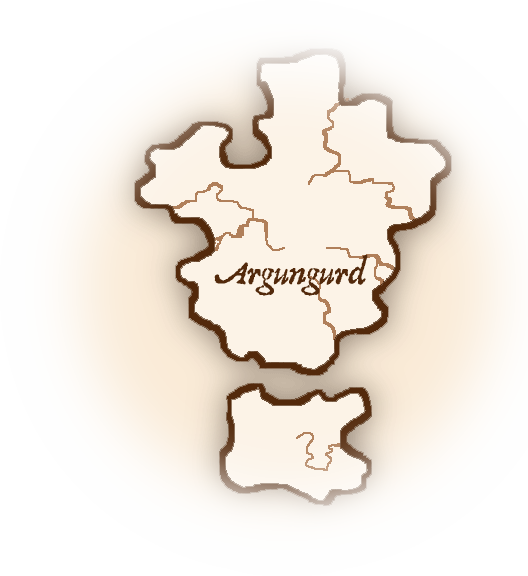
Gurdish Grammar
Contents
Nouns
Pluralization: The simple plural is formed by adding -(a)gun to the end of a noun. E.g. hovmur "house" and hovmuragun" "houses", garva "man" and garvagun "men." The multiple plural (giving the sense of a large group of things) is formed by adding grav- to the start of the noun, in addition to the plural suffix. E.g. andaz "voice," gravandazagun "many voices."
Articles: There is only one article in Gurdish, ud, which can mean "a" (in the sense of "a particular one") or "the," depending on context. It is placed before the noun. E.g. rulgom "star," ud rulgom "a/the star."
Back to topVerbs
Conjugation
Gurdish verbs follow one of two conjugation patterns: the "weak" verbs, which end in -an, and the "strong" verbs, which do not. They inflect for person and for tense.
In the tables below, the affixes for strong verbs will be listed above those for weak verbs.
Present Indicative
| Person | Prefix | Example |
|---|---|---|
| 1p singular | bo- bod- | borang "I live" bodbuogan "I walk" |
| 2p singular | du- dud- | durang "You live" dudbuogan "You walk" |
| 3p singular (masculine) | ju- jud- | jurang "He lives" judbuogan "He walks" |
| 3p singular (feminine) | jun- junud- | junrang "She lives" junudbuogan "She walks" |
| 3p singular (neuter) | jud- jud- | judrang "It lives" judbuogan "It walks" |
| 1p plural | da- dad- | darang "We live" dadbuogan "We walk" |
| 2p plural | vuz- vuzud- | vuzrang "They live" vuzudbuogan "They walk" |
Other Tenses/Moods
Other tenses and moods are indicated by infixes placed after the subject prefix. These do not vary between strong and weak verbs.
| Tense/Mood | Infix | Example |
|---|---|---|
| Present Continuous | -gur- | bogurmogan "I am speaking" |
| Past indicative | -gom- | jugomogan "He spoke" |
| Past continuous | -am- | duamandurg "You were speaking" |
| Present perfect | -gud- | bogudmogan "I have spoken" (finished speaking) |
| Past perfect | -ad- | Juadgardang duva "He had crushed him" |
| Interrogative | -za- | Duzagan? "Do you know?" |
Negation
Negation is accomplished somehow, but for some reason I never decided...this will have to be addressed in the future.
Back to top
Pronouns
Personal pronouns are not often used in the nominative case, since verbs are inflected to show person. However, they are sometimes used for emphasis.
| Nominative | Accusative | Genitive | |
|---|---|---|---|
| I | boa | boava | boago |
| you | du | duva | dugo |
| he | ju | juva | jugo |
| she | jun | junva | jungo |
| it | jud | judva | jujo |
| we | dabu | dabuva | dabugo |
| they | vuz | vuzva | vuzgo |
Sentence Structure
Sentences follow a subject-verb-object order. Adjectives and adverbs are placed immediately before the word they modify.
Examples:
- (Boa) Boguld garva. ("I am a man.")
- Ud mugan junmaha muru goragun. ("The woman has blue eyes.")
- (Dabu) Damaha [negation?] rovu dum danagu buogagun. ("We do not have yellow and green feet.")